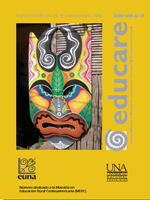Maestría en educación rural centroamericana: hacia un modelo pedagógico flexible
DOI:
https://doi.org/10.15359/ree.12-Ext.2Keywords:
pedagogical model, distance learning and itinerancy, virtual componentAbstract
Program in Rural Education” is presented to the national and international community as a high level graduate program, whose purpose is to improve the quality of formal and informal educational processes within the area through an innovative pedagogical model that includes itinerancy along the isthmus, as well as in site and distance learning with a virtual component. Furthermore, this program bases its practice on the development of a flexible model, on inclusiveness and also on a differentiated methodological and evaluative proposal that recovers the knowledge produced in every country around de issue of rural education.
References
Moran, L. y Myringer, B. (1999). Flexible learning and university change [Entornos virtuales y formación
flexible]. En H. Keith (Ed.), Higher EducationThrough Open and Distance Learning
(pp. 52-72). Londres: Routledge.
Peralta, V. (1996). Curriculos educacionales en América Latina. Buenos Aires: Editorial Andrés
Bello.
Salinas, J. (2003). Entornos virtuales y formación flexible. Tecnología en marcha, 17 (3) especial,
-80.
Salinas, J. (2005). Cambios metodológicos en las TIC. Estrategias didácticas y entornos virtuales
de enseñanza-aprendizaje. Palma de Mallorca, España: UIB.
Salinas, J. (2006). La formación flexible entre la enseñanza presencial y la educación a distancia:
Modelos y experiencias. Palma de Mallorca, España: UIB.
UNA-CIDE-DER. (2003). Mejoramiento cualitativo de la Educación Básica en las comunidades
rurales de Centroamérica: aportes desde la Educación Superior. Documento de proyecto.
Downloads
Published
How to Cite
Issue
Section
License
1. In case the submitted paper is accepted for publication, the author(s) FREELY, COSTLESS, EXCLUSIVELY AND FOR AN INDEFINITE TERM transfer copyrights and patrimonial rights to Universidad Nacional (UNA, Costa Rica). For more details check the Originality Statement and Copyright Transfer Agreement
2. REUTILIZATION RIGHTS: UNA authorizes authors to use, for any purpose (among them selfarchiving or autoarchiving) and to publish in the Internet in any electronic site, the paper´'s final version, both approved and published (post print), as long as it is done with a non commercial purpose, does not generate derivates without previous consentment and recognizes both publisher's name and authorship.
3. The submission and possible publication of the paper in the Educare Electronic Journal is ruled by the Journal’s editorial policies, the institutional rules of Universidad Nacional and the laws of the Republic of Costa Rica. Additionally, any possible difference of opinion or future dispute shall be settled in accordance with the mechanisms of Alternative Dispute Resolution and the Costa Rican Jurisdiction.
4. In all cases, it is understood that the opinions issued are those of the authors and do not necessarily reflect the position and opinion of Educare, CIDE or Universidad Nacional, Costa Rica. It is also understood that, in the exercise of academic freedom, the authors have carried out a rogorous scientific-academic process of research, reflection and argumentation thar lays within the thematic scope of interest of the Journal.
5. The papers published by Educare Electronic Journal use a Creative Commons License:














 The articles published by Educare Electronic Journal can be shared with a Creative Commons License:
The articles published by Educare Electronic Journal can be shared with a Creative Commons License: 



